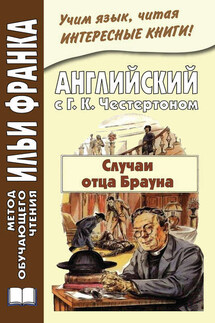Английский с Г. К. Честертоном. Случаи отца Брауна / Gilbert Keith Chesterton. The Sins of Prince Saradine. The Eye of Apollo - страница 12
) the other servants now in the house being new (все остальные: «другие» слуги в доме были новыми) and collected in Norfolk by the housekeeper (и нанятыми в Норфолке /самой/ экономкой; to collect – собирать; укомплектовывать, подбирать). This latter lady went by the name of Mrs. Anthony (эта последняя = вышеупомянутая дама именовалась миссис Энтони; to go by the name – быть известным под именем), but she spoke with a slight Italian accent (но говорила с легким итальянским акцентом), and Flambeau did not doubt (и Фламбо не сомневался) that Anthony was a Norfolk version of some more Latin name (что «Энтони» – это норфолкская интерпретация какой-то труднопроизносимой латинской фамилии; more – более многочисленный; добавочный, дополнительный; name – имя; фамилия).
Mr. Paul, the butler, also had a faintly foreign air (мистер Пауль, дворецкий, тоже немного походил на иностранца: «имел слегка заграничный вид»; air – воздух, атмосфера; внешний вид /человека/), but he was in tongue and training English (но в его разговоре и манерах /угадывалась/ английская школа; training – воспитание, обучение), as are many of the most polished men-servants of the cosmopolitan nobility (как и у большинства вышколенных слуг знатных космополитов; to polish – полировать; делать изысканным, наводить лоск). Pretty and unique as it was, the place had about it a curious luminous sadness (несмотря на то, что дом был красив и необычен, повсюду чудилась странная светлая печаль; luminous – светящийся). Hours passed in it like days (часы проходили в нем, словно дни). The long, well-windowed rooms were full of daylight (длинные комнаты со множеством окон были залиты дневным светом: «были полны дневного света»), but it seemed a dead daylight (но этот свет казался неживым). And through all other incidental noises (и поверх всех прочих случайных звуков; incidental – побочный, дополнительный; noise – шум; звук /обыкн. неприятный/), the sound of talk, the clink of glasses, or the passing feet of servants (шума голосов: «звука разговоров», позвякивания стаканов, быстрых шагов слуг; passing – мгновенный, мимолетный; foot – ступня; поступь, шаг), they could hear on all sides of the house the melancholy noise of the river (со всех сторон дома они могли слышать = до них доносился грустный плеск: «шум» реки).
Pretty and unique as it was, the place had about it a curious luminous sadness. Hours passed in it like days. The long, well-windowed rooms were full of daylight, but it seemed a dead daylight. And through all other incidental noises, the sound of talk, the clink of glasses, or the passing feet of servants, they could hear on all sides of the house the melancholy noise of the river.
“We have taken a wrong turning, and come to a wrong place (мы выбрали не тот поворот и попали в неподходящее место;







